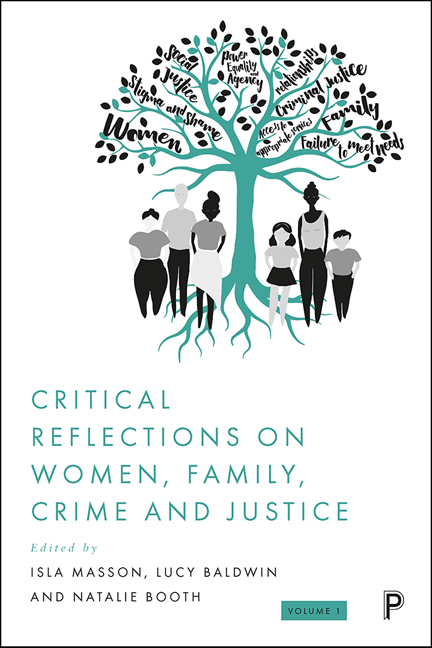Book contents
- Frontmatter
- Contents
- List of figures
- Notes on the contributors
- Acknowledgements
- Foreword: critical reflections from the Women, Family, Crime and Justice network
- 1 Starting the conversation: an introduction to the Women, Family, Crime and Justice network
- 2 Playing the game: women and community punishment
- 3 Harmful social and cultural practices that exist within South Asian communities in the UK and their impact on women
- 4 Exploring shame, love and healing within women’s recovery: an analysis of a trauma-specific intervention
- 5 Reducing the enduring harm of short terms of imprisonment
- 6 ‘Without it you’re lost’: examining the role and challenges of family engagement services in prisons
- 7 What are the challenges and opportunities for schools in supporting children of people in prison?
- 8 Impact and engagement work in the context of families of people in prison
- 9 Presence, voice and reflexivity in feminist and creative research: a personal and professional reflection
- 10 Service users being used: thoughts to the research community
- 11 Continuing the conversation: reflections from the Women, Family, Crime and Justice network
- Index
8 - Impact and engagement work in the context of families of people in prison
Published online by Cambridge University Press: 21 December 2021
- Frontmatter
- Contents
- List of figures
- Notes on the contributors
- Acknowledgements
- Foreword: critical reflections from the Women, Family, Crime and Justice network
- 1 Starting the conversation: an introduction to the Women, Family, Crime and Justice network
- 2 Playing the game: women and community punishment
- 3 Harmful social and cultural practices that exist within South Asian communities in the UK and their impact on women
- 4 Exploring shame, love and healing within women’s recovery: an analysis of a trauma-specific intervention
- 5 Reducing the enduring harm of short terms of imprisonment
- 6 ‘Without it you’re lost’: examining the role and challenges of family engagement services in prisons
- 7 What are the challenges and opportunities for schools in supporting children of people in prison?
- 8 Impact and engagement work in the context of families of people in prison
- 9 Presence, voice and reflexivity in feminist and creative research: a personal and professional reflection
- 10 Service users being used: thoughts to the research community
- 11 Continuing the conversation: reflections from the Women, Family, Crime and Justice network
- Index
Summary
Introduction
Research on families and children impacted by imprisonment is a rich and growing field of research (for example Kotova, 2019; Booth, 2020). Despite the fact that families of people in prison were described as the ‘forgotten victims’ as recently as 2007 (Light and Campbell, 2007), their experiences are now receiving a great amount of scholarly attention. For example, a recent collection of chapters edited by Condry and Scharff Smith (2018), examined a wide range of experiences of families of people in prison across the world and discussed the ways in which imprisonment shapes their lives and identities. The numerous consequences for families include grief, practical difficulties associated with maintaining the relationship in question, financial challenges, and stigma (see Condry et al, 2016 for an overview).
At policy level, there is also an emerging awareness of the importance of family ties for men and women in prison, as demonstrated by recent government reports on the family ties of men (Farmer, 2017) and of women (Farmer, 2019) in prison. As a response to the first Farmer Review (Farmer, 2017), Her Majesty's Prison and Probation Service (HMPPS) has obliged each prison to develop a Families and Significant Others Strategy, focusing on how visits, extended family visits for eligible people in prison and family support are maintained and reinforced. These strategies have been conveniently archived on the National Information Centre on Children of Offenders website. This recent focus on the importance of family and family ties in relation to rehabilitation has led to a number of significant and positive developments – not least, the implementation of the HMPPS Families group, which has been tasked with overseeing additional family-focused developments and family-related policies.
The Families and Significant Others Strategy encompasses activities such as visits and other aspects of prison policy that involve families directly. Although these are undoubtedly important, arguably every facet of prison may have some impact on families outside. Historically, families have not been the central focus when making prison policy. For instance, when Chris Grayling, the then Justice Minister, limited the sending in of books to people in prison in 2013, some relatives noted that this, in effect, limited their ability to connect with their relative in prison via sharing books they enjoyed (see overview in Prison Reform Trust, 2014).
- Type
- Chapter
- Information
- Critical Reflections on Women, Family, Crime and Justice , pp. 153 - 172Publisher: Bristol University PressPrint publication year: 2021



